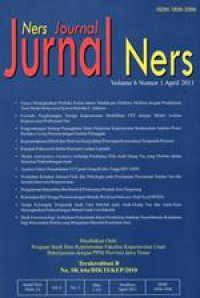
Jurnal
Development of Model on Mothers Self-Efficacy in Preventing Recurrence of Non-Pneumonia Acute Respiratory Infection among Toddlers
Introduction: Acute Respiratory Infection (ARI) is the leading cause of morbidity and mortality in children. A cough and cold diseases such as rhinitis, pharyngitis, tonsillitis and other upper respiratory diseases are classified as non-pneumonia. ARIs that are not appropriately handled will affect the lung tissue and cause severity and even death. The purpose of this study is to develop a model of self-efficacy (SE) among mother to prevent recurrent (PR) non pneumonia (NP)-ARI on toddlers based on the integration of Precede-Proceed Model and Health Belief Model. Method: This study used cross-sectional design. The population were a mother with a toddler in Tanggalrejo Village of Mojoagung Jombang. A hundred toddler’s mothers were recruited as samples by cluster sampling. Variables in this study were predisposing-enabling-reinforcing factors, main constructs of perceived (MCP), perceived threat, SE and PRNP-ARI. Data were collected using questionnaire, and Focus Group Discussion then analyzed using Partial Least Square (PLS). Results: The SE improvement model for the PRNP-ARI was formed from predisposing-enabling-reinforcing factors, MCP, perceived threat, and maternal SE. The greatest effect was on MCP against a perceived threat with T statistic value = 11.07. Conclusion and recommendation: Increasing SE of toddler's mother can be done by educating mother about ARI concept, conventional ARI treatment, environmental modification, benefits of mask use, clean and healthy life behavior, proper hand washing, nutrition feeding, exclusive breastfeeding, stress management; create peer support group for toddlers mother; and optimizing the role of health officers and family support.
Availability
No copy data
Detail Information
- Series Title
-
Jurnal Ners, Vol. 12 No. 2 Oktober 2017
- Call Number
-
(05) 610.5 PRO j
- Publisher
- Surabaya : Prodi Ilmu Keperawatan FK Unair., 2017
- Collation
-
Hlm. 171-179
- Language
-
English
- ISBN/ISSN
-
1858-3598
- Classification
-
(05) 610.5 PRO j
- Content Type
-
-
- Media Type
-
-
- Carrier Type
-
-
- Edition
-
Vol. 12 No. 2
- Subject(s)
- Specific Detail Info
-
-
- Statement of Responsibility
-
-
Other version/related
No other version available
File Attachment
Comments
You must be logged in to post a comment
 Computer Science, Information & General Works
Computer Science, Information & General Works  Philosophy & Psychology
Philosophy & Psychology  Religion
Religion  Social Sciences
Social Sciences  Language
Language  Pure Science
Pure Science  Applied Sciences
Applied Sciences  Art & Recreation
Art & Recreation  Literature
Literature  History & Geography
History & Geography